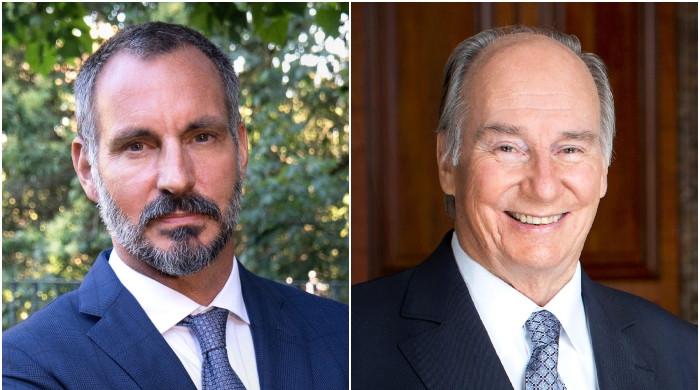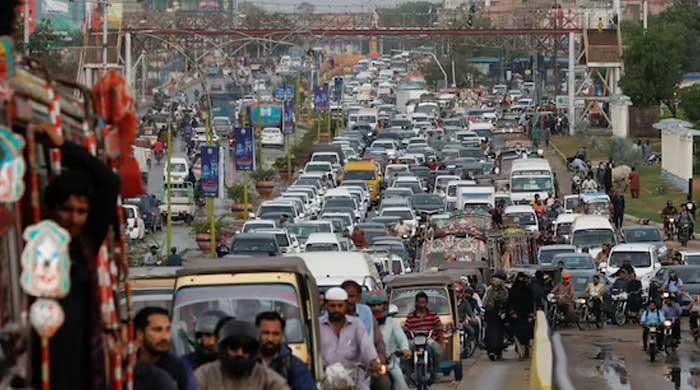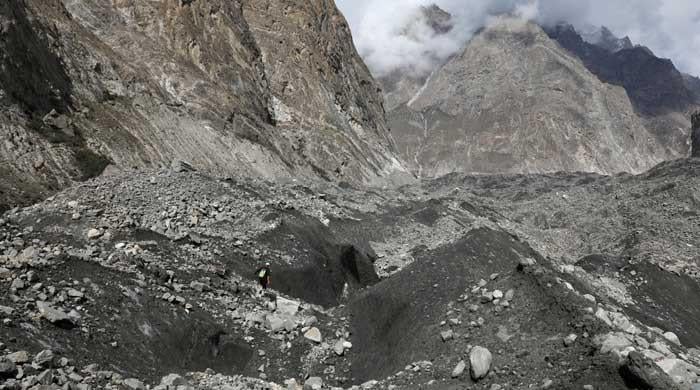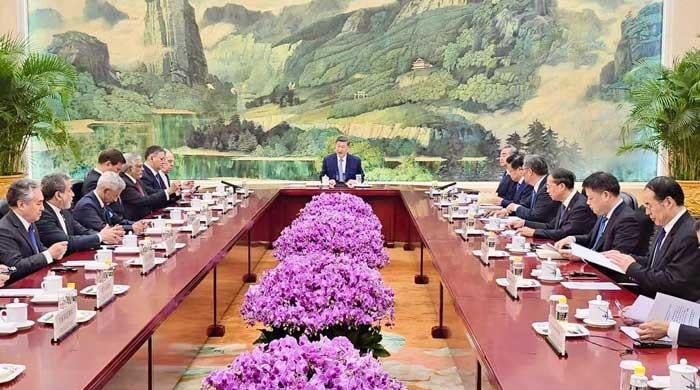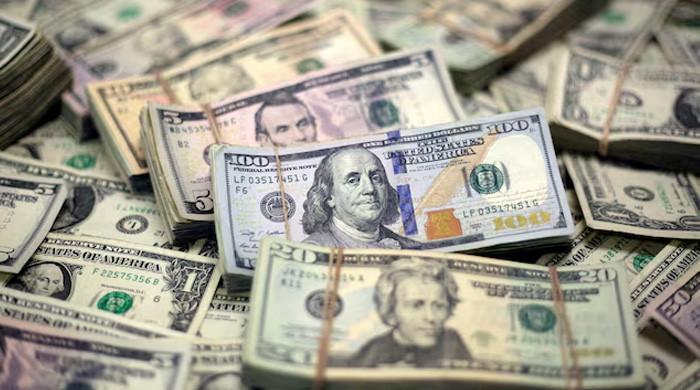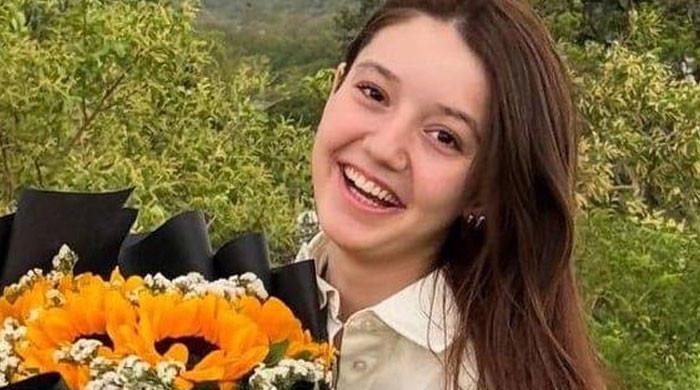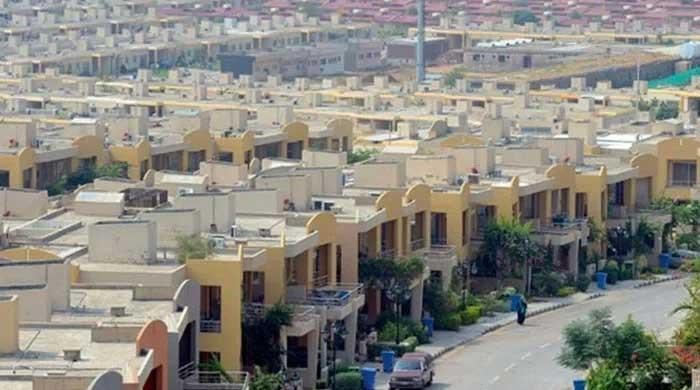Pakistani national songs: Eminent to keep the patriotic zeal alive
Women walk past illuminated posters illustrating Pakistan's freedom fighters ahead of the country's 76th Independence Day, in Lahore on August 12, 2023. — AFP
On Pakistan’s 76th...
August 14, 2023
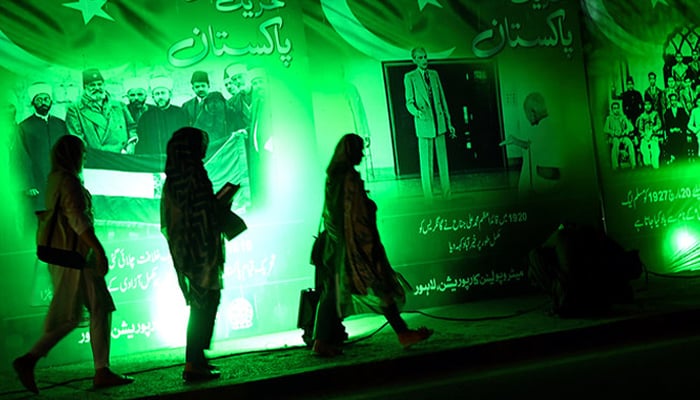
On Pakistan’s 76th Independence, one cannot spend the event without taking a trip down memory lane and reminiscing over the melodious eras of National songs from 1947 till date. The patriotic songs, without a doubt, instill passion and ignite a love of the country in the nation’s heart.
Filled with hearty enthusiasm, national songs often are associated with a particular country, celebrating and accentuating the country's history, cultural festivals, political rallies, and the people.
Not only that, national songs can be used to promote national unity and pride, or to commemorate important occasions in a country's history.
So let’s jump into the jingoistic musical journey of Pakistan, rooted in 1947.
When Mian Bashir first wrote Millat ka Pasban Hai Muhammad Ali Jinnah, which was later sung by Munawwar Sultana and QadirFaridi, in 1947, for Radio Pakistan Lahore, it was a fitting tribute to the Father of the Nation — Muhammad Ali Jinnah.
In 76 years of Pakistan's history, many meticulously melodious songs were produced, which still warm our hearts and can reinvigorate anyone emotionally.
Pak Sar Zamin Shadbad, the national anthem reminds us of our ancestors who sacrificed their lives for this country and the mass migration of people at the time of partition.
The euphonious national anthem of Pakistan was composed by Ahmad G Chhagla in 1949 and was written by Hafeez Jalandhari in 1952. Its harmonious tune alone leaves any Pakistani in tears.
Chaand roshan chamakta sitara rahe, written by Shaukat Thanvi, an eminent Pakistani poet, attained more significance, referred to as the anthem (tarana) once it had the approval of our Quaid-i-Azam.
It was aired on Radio Pakistan after Jinnah’s address to the nation on August 14, 1947. Sung by Dilshad Begum, this song is a sincere prayer to see Pakistan rise and shine forever when it says, "Ta qayamat yeh jhanda humaara rahe."
Mehdi Hassan in 1962, in his enticing voice sang "Yeh watan tumhara hai," and infused passion into the nation, to take charge of this land as its guardians. "Mir-e-karwaan hum thay, rooh-e-karwaan tum ho.Hum to sirf unwaan thay, asal dastaan tum ho," was his message to the people of Pakistan to work for the prosperity of this country.
Later on in 1965, to keep the zeal alive many singers came forward to boost the confidence of their soldiers and to show solidarity.
The legendary Naseem Begum with her "Aye raah-e-haq kay shaheedo and Aye watan kay sajeele jawaano," and Madam Noor Jahan respectively, extended deep empathy towards our martyred brave soldiers and their families. This era gave us the most memorable national songs.
The bravery and enthusiasm of each Pakistani to stand behind the army in tough times could not be better expressed than in Apni jaan nazar karon by late Mehdi Hassan.
Chaand meri zameen and Aye watan pyare watan in the enchanting voice of Ustad Amanat Ali Khan and Aye nigar-e-watan tu salamat rahe by Habib Wali Muhammad were the major hits, written by Jamiluddin Aali.
The 70s era has witnessed many iconic singers of Pakistan including Alamgir and Shahnaz Begum. Alamgir’s Allah ka inaam yeh azaad watan, Maaon ki dua poori hui, and Shahnaz Begum’s Sohni dharti Allah rakhe, Diya jalaye rakhna hai and Jeevay Jeevay Pakistan are a classic examples of the love and affection these artists showed towards their motherland.
I believe, when talking about Muslim community’s love, passion and sacrifices towards Pakistan it is equally pertinent to mention the musical fraternity from minority communities that have given our childhoods rare glimpses of unconditional love.
Nerissa, Beena, and Shabana Benjamin, famously known as the Benjamin sisters, stole the hearts of Pakistanis with their song Khayal rakhna. The three sisters also teamed up with the veteran singer Sajjad Ali to sing Aye rooh-e-Quaid aaj kay din hum tujh se waada kerte hain, a song that promises to keep Pakistan safe and to guard its honour at any cost.
The first half of the ‘80s is incomplete without the mention of Muhammad Ifrahim’s Zameen ki godd rang se umang se bhari rahe and Amjad Hussain’s Tera Pakistan hai yeh mera Pakistan hai, because it again encourages the youth with compassionate poetry with its lyrics, "Iss per dil qurban iss per jaan bhi nisar hai."
Another popular name that can never leave our sight when mentioning the late ’80s and early ’90s is Nayyara Noor, whose beautiful voice had the power of winning hearts. Her song Watan ki mitti gawah rehna is one of the most beautiful compositions, while the song Issparcham kay saye talay hum ek hain, gives the message of unity among all people of Pakistan.
The magnificent pop duo of Nazia and Zohaib Hassan paid tribute to their motherland in their album ‘Hotline’ which was released in 1987. Dharti humari hai, asmaan humara hai celebrates the beauty with which Pakistan has been gifted.
The year 1987 was the year of the late Junaid Jamshed when his band “Vital Signs” gained fame with a beautifully composed song Dil dil Pakistan. The song was produced by Shoaib Mansoor and Rohail Hyatt’s music turned it into a “pop national anthem.”
Hum hain Pakistani, Tera karam maula and Qasam uss waqt ki, were some other musical sensations by the beloved Junaid Jamshed, on PTV back in the 1990s when cable culture was not too deeply-rooted.
Enter and exit the '90s with Ustad Nusrat Fateh Ali Khan’s, Mera paigham Pakistan is one of the few songs that have the strength to give chills to any Pakistani because of its captivating lyrics and appealing melody. No other expression and no other voice could have defined the vision of Iqbal and the hard work of Quaid-i-Azam better than “Nida Quaid kihai, Iqbal kailham Pakistan.”
This is the start of the 90’s era and super hits by the band Junoon cannot be overlooked either. Hai jazba junoon to himmat na haar and Junoon se aur ishq se, contains enough energy to hit-in the right chords of nationalism.
Haroon Rashid and Faakhir Mehmood teamed up as a band, Awaaz, in the late 90's. Their joint venture gave us Aye Jawan, a national song that is in everyone's hearts. Later, the two singers were separated but succeeded in giving back-to-back smashing songs, such as Tere bina dil na lagay by Faakhir and Dil se main ne dekha Pakistan by Haroon.
The third generation of Pakistan was welcomed by many new singers who managed to satisfy the ardour of nationalism with their beguiling music.
Ahmed Jahanzeb’s Pakistan humari jaan, Atif Aslam and Strings’ collaboration presenting Ab khud kuch karna paray ga, Strings’ original Main to dekhonga, Ali Zafar’s Urainge, and Jal’s Tu qadam barhaye ja are expressions of devotion to change the fate of Pakistan and to keep the country on the right track.
In 2017, Haroon Rashid remade his chart-buster song Dil se mainay dekha Pakistan and its music video seeks to inspire youth by highlighting and paying homage to Pakistani heroes.
Whether it's old national anthems or new-age revolutionary music, Pakistanis are a nation that loves music.
A video that once went viral on social media before 14th August showed children of Northern Pakistan standing and forming a military band, playing music by re-using home appliances (ghee tins), water bottles, and other household utensils that could produce some musical sounds with small twigs. They sang Aao bacho sair karaen tum ko Pakistan ki, and simply sent waves of optimism nationwide.
And why not, the love for this country is in our blood. No one can steal it from us. Pakistan Zindabad!




